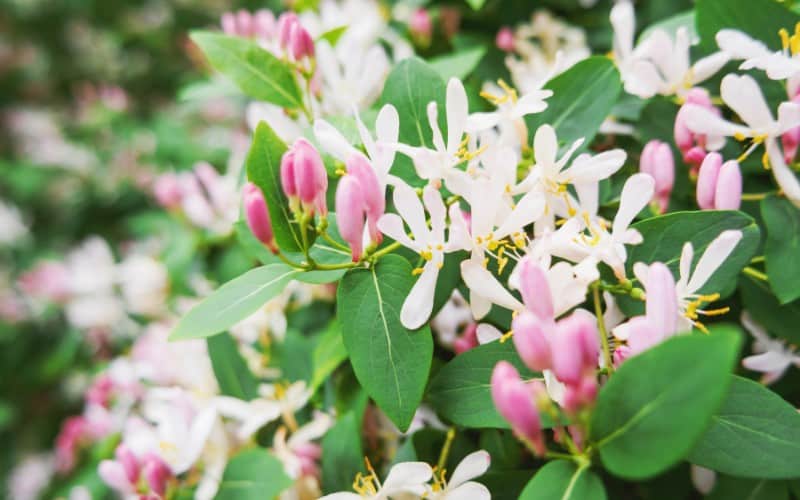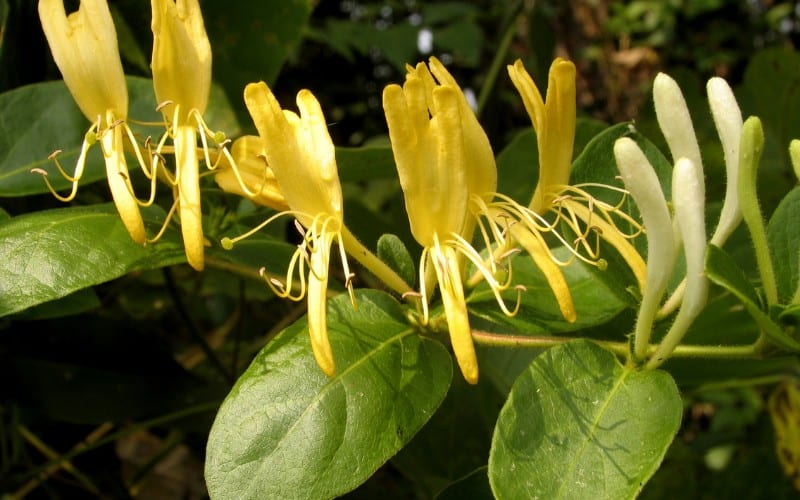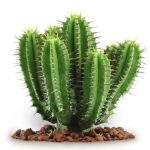The honeysuckle plant has a lovely fragrance that never goes unnoticed. Its nectar taste is sweet as well. This wild plant graces any landscape with its attractive yellow or bright-red blossoms.
Honeysuckle, with the scientific name, Lonicera spp. belong to species consisting of hardy vines and shrubs found in most states in America.
There are about 180 varieties of the honeysuckle plant - some are evergreen in warm regions, while others are deciduous. But apart from the beauty this plant can add to your landscape, is honeysuckle poisonous to dogs? Yes, honeysuckle is poisonous to dogs due to several reasons we'll discuss below.
Read Also: Why Dianthus Is Not Safe For Dogs
Table of Contents
Is Honeysuckle Poisonous to Dogs?
Honeysuckle secretes a fluid that froths when it is combined with a dog’s body fluid. This fills the intestines with gases, which causes the dog to feel pain, digestive trouble, and discomfort.
Its flowers and stems produce cyanogenic glycosides and saponic, combined with the dog’s blood bursting the red blood cells. This reduces the oxygen level in the blood. Also, when cyanogenic glycosides combine with acid in the dog’s stomach, it turns to cyanide.
Additionally, honeysuckle berries contain carotenoids toxic to dogs that cannot digest it, eventually causing discomfort. When consumed in little doses, these substances are harmless. They are only poisonous to dogs when eaten in excess.
Interesting Facts About the Honeysuckle Plant
- The Honeysuckle plant grows best in full sun but can tolerate shade.
- It can tolerate different types of soils.
- It can be grown inside containers or on the ground with or without support.
- The sweet scent of honeysuckle nectar attracts hummingbirds and butterflies.
- Some honeysuckle varieties are poisonous to dogs depending on the toxicity.
Poisonous Honeysuckle Varieties
Most honeysuckle plants are toxic, but the exact cultivar or specie is still unknown. Hence, honeysuckles are considered poisonous to dogs. Here are the commonly grown species below:
Japanese honeysuckle
Scientific name: Lonicera japonica
This hardy perennial plant has white flowers and dark-green leaves. It turns blue-black when it is matured. The fruits from this species are poisonous to humans and pets.
Tartarian honeysuckle
Scientific name: Lonicera tatarica
It is a hardy shrub with light green leaves or sometimes blue-green. It has reddish-pink colored flowers and bright red-orange berries.
Common honeysuckle
Scientific name: Lonicera periclymenu
This honeysuckle plant variety has two green color shades leaves with white borders. Its flowers are purple-pink, and they open with cream color or light pink.
Coral honeysuckle
Scientific name: Lonicera sempervirens
This specie has coral colored flowers and green leaves with bright red fruits. They attract hummingbirds.
Read Also: Why Bugleweed Is Safe For Cats
Symptoms of Honeysuckle Poisoning in Dogs
The following are symptoms of honeysuckle poisoning in dogs:
- Irregular heartbeat
- Vomiting
- Diarrhea
- Loss of appetite
- Stomach rupture
- Thirst
- Respiratory failure
- Weakness
- Fever
- Bone damage
- Death
Treatment of Honeysuckle Poisoning
If you notice your dog has eaten any part of the honeysuckle plant, take the dog to the veterinarian immediately. You can take the plant to the veterinarian clinic if you are not sure the plant ingested is the honeysuckle plant.
How to Remove Honeysuckle from Your Garden
Some honeysuckle species are invasive. You can hand-pull the seedlings to stop the least invasive species from spreading. Herbicide works best for more aggressive species that are not in the seedling stage.
Mix 4-5 tablespoons 41% glyphosate with water (1 gallon) in a sprayer. Spray the honeysuckle leaves with this mixture thoroughly. Keep your dog away from this area or the sprayed leaves.
Note: Ensure you protect yourselves while applying the herbicide by wearing gloves, hats, goggles, masks, shoes, and protective clothing.
How to Prevent Honeysuckle Poisoning on Dogs
To prevent honeysuckle poisoning, do not grow the plant in your garden. However, if you already do, you have to limit the dog’s access to this area of your garden. Because the honeysuckle plant proliferates, always keep an eye on your dog.
This helps to stop the dog from eating the plant berries while walking outdoor. Consult your veterinarian if any symptoms of honeysuckle poisoning are noticed. Also, be sure of the plant you introduce to your garden if You were doing a little research before this will help you know what plant is toxic to your dog.
Read Also: Is Irish Moss Toxic for Dogs?
Conclusion
Most honeysuckle varieties are not toxic to dogs. Others contain glycosides in their vines or stems and carotenoids in their berries.
If the honeysuckle plant is eaten in copious quantities, they cause illness. Some symptoms include vomiting, increased heartbeat, diarrhea, and so on.
Keeping your dog from accessing this plant is advised to prevent possible poisoning.






